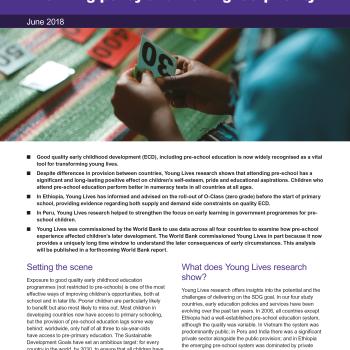
IMPACT CASE STUDY Early Child Development: informing policy and making it a priority
Summary
This Young Lives impact case study details the role of early child development (ECD) in informing policy and making it a priority. For related impact stories, please follow us on Twitter @yloxford.
In overview:
Good quality early childhood development (ECD), including pre-school education is now widely recognised as a vital tool for transforming young lives. Despite differences in provision between countries, Young Lives research shows that attending pre-school has a significant and long-lasting positive effect on children’ self-esteem, pride and educational aspirations. Children who attend pre-school education perform better in numeracy tests in all countries at all ages. In Ethiopia, Young Lives has informed and advised on the roll-out of O-Class (zero grade) before the start of primary school, providing evidence regarding both supply and demand side constraints on quality ECD. In Peru, Young Lives research helped to strengthen the focus on early learning in government programmes for preschool children. Young Lives was commissioned by the World Bank to use data across all four countries to examine how pre-school experience affected children’ later development. The World Bank commissioned Young Lives in part because it now provides a uniquely long time window to understand the later consequences of early circumstances. This analysis will be published in a forthcoming World Bank report.
IMPACT CASE STUDY Early Child Development: informing policy and making it a priority
Summary
This Young Lives impact case study details the role of early child development (ECD) in informing policy and making it a priority. For related impact stories, please follow us on Twitter @yloxford.
In overview:
Good quality early childhood development (ECD), including pre-school education is now widely recognised as a vital tool for transforming young lives. Despite differences in provision between countries, Young Lives research shows that attending pre-school has a significant and long-lasting positive effect on children’ self-esteem, pride and educational aspirations. Children who attend pre-school education perform better in numeracy tests in all countries at all ages. In Ethiopia, Young Lives has informed and advised on the roll-out of O-Class (zero grade) before the start of primary school, providing evidence regarding both supply and demand side constraints on quality ECD. In Peru, Young Lives research helped to strengthen the focus on early learning in government programmes for preschool children. Young Lives was commissioned by the World Bank to use data across all four countries to examine how pre-school experience affected children’ later development. The World Bank commissioned Young Lives in part because it now provides a uniquely long time window to understand the later consequences of early circumstances. This analysis will be published in a forthcoming World Bank report.
